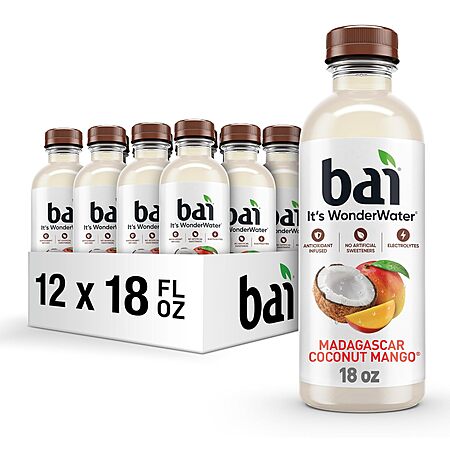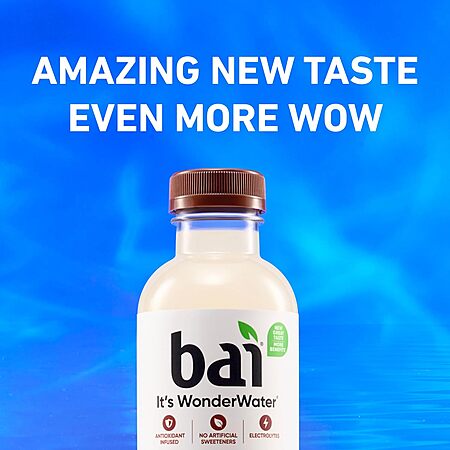frontpageBBQchicken | Staff posted Jan 06, 2025 05:07 AM
Item 1 of 2
Item 1 of 2
frontpageBBQchicken | Staff posted Jan 06, 2025 05:07 AM
12-Pack 18-Oz Bai Antioxidant Infused Water (Madagascar Coconut Mango)
w/ Subscribe & Save$11
$20
45% offAmazon
Get Deal at AmazonGood Deal
Bad Deal
Save
Share




Leave a Comment
Top Comments
1. Erythritol
Erythritol is a sugar alcohol used as a low-calorie sweetener. It is generally recognized as safe (GRAS) by the FDA, but excessive consumption can cause digestive discomfort, including bloating or diarrhea, especially in sensitive individuals134.
2. Stevia Leaf Extract
Stevia is a natural sweetener derived from the Stevia rebaudiana plant. While it is considered safe, some people report a bitter aftertaste or mild gastrointestinal issues when consuming products containing stevia34.
3. Malic Acid
Malic acid is added to enhance tartness and flavor. However, lawsuits have alleged that some versions of malic acid used in Bai drinks are synthetically produced from petrochemicals rather than naturally derived, raising concerns about misleading labeling and the use of artificial additives810.
4. Natural Flavors
The term "natural flavors" can encompass a wide range of substances derived from natural sources but processed chemically. While these are not inherently harmful, their exact composition is often undisclosed, which may be a concern for consumers seeking transparency23.
5. Coffeefruit Extract
Coffeefruit extract provides antioxidants and natural caffeine (about 78 mg per bottle). While beneficial in moderation, caffeine can cause side effects like jitteriness, increased heart rate, and sleep disturbances in sensitive individuals or when consumed in excess15.
6. Citric Acid
Citric acid acts as a preservative and flavor enhancer. Although it is commonly used in food products, excessive intake has been linked to enamel erosion in teeth and potential irritation for those with acid sensitivity2.
7. Vegetable Juice Concentrates (for Color)
These are used for natural coloring but are generally considered safe. However, they may contain trace amounts of pesticides depending on sourcing.
8. Sodium Citrate
Sodium citrate is used to regulate acidity but poses minimal risk unless consumed in extremely high quantities.
10 Comments
Sign up for a Slickdeals account to remove this ad.
Order Summary
Items: $12.00
Shipping & handling: $0.00
Subscribe & Save: -$1.80
Total before tax: $10.20
Estimated tax to be collected: $0.51
Order total: $10.71
Our community has rated this post as helpful. If you agree, why not thank HappyKnob286
Our community has rated this post as helpful. If you agree, why not thank drpepper84
1. Erythritol
Erythritol is a sugar alcohol used as a low-calorie sweetener. It is generally recognized as safe (GRAS) by the FDA, but excessive consumption can cause digestive discomfort, including bloating or diarrhea, especially in sensitive individuals134.
2. Stevia Leaf Extract
Stevia is a natural sweetener derived from the Stevia rebaudiana plant. While it is considered safe, some people report a bitter aftertaste or mild gastrointestinal issues when consuming products containing stevia34.
3. Malic Acid
Malic acid is added to enhance tartness and flavor. However, lawsuits have alleged that some versions of malic acid used in Bai drinks are synthetically produced from petrochemicals rather than naturally derived, raising concerns about misleading labeling and the use of artificial additives810.
4. Natural Flavors
The term "natural flavors" can encompass a wide range of substances derived from natural sources but processed chemically. While these are not inherently harmful, their exact composition is often undisclosed, which may be a concern for consumers seeking transparency23.
5. Coffeefruit Extract
Coffeefruit extract provides antioxidants and natural caffeine (about 78 mg per bottle). While beneficial in moderation, caffeine can cause side effects like jitteriness, increased heart rate, and sleep disturbances in sensitive individuals or when consumed in excess15.
6. Citric Acid
Citric acid acts as a preservative and flavor enhancer. Although it is commonly used in food products, excessive intake has been linked to enamel erosion in teeth and potential irritation for those with acid sensitivity2.
7. Vegetable Juice Concentrates (for Color)
These are used for natural coloring but are generally considered safe. However, they may contain trace amounts of pesticides depending on sourcing.
8. Sodium Citrate
Sodium citrate is used to regulate acidity but poses minimal risk unless consumed in extremely high quantities.
Sign up for a Slickdeals account to remove this ad.
Sucralose has also been shown to do this to some people but I have no issue with it.
Leave a Comment